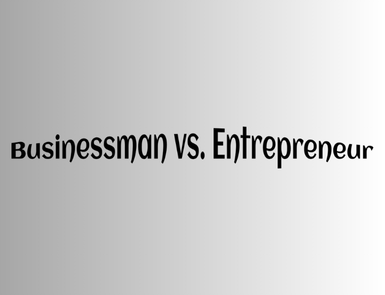
Sometimes, people use the terms ‘businessman’ and ‘entrepreneur’ interchangeably. At first glance, both titles seem similar. They exhibit many similarities in terms of management and operation. However, they take distinct approaches to business.
This post, Businessman vs. Entrepreneur, will help you decide which path is right for you. Read it to explore the primary differences between the terms.
Overview of a Businessman
A businessman runs a business that provides products or services to customers. The primary goal of a business owner is to make a profit by selling their goods or services. Generally, they have a thorough understanding of their industry and target customers.
A businessperson might purchase a franchise or launch a new business. However, the business concept is usually tried and tested.
Generally, business people try to keep things predictable and do not take significant risks. In short, they do not develop new things.
You can measure a business’s success by its profit. It operates in a competitive market and thrives by outperforming its rivals.
Types of Businessmen
- Sole Proprietor: A sole proprietor is someone who owns a business on their own. They manage the whole company and make all the decisions themselves.
- General Partners: In this type of business, two or more individuals share ownership. They are equally accountable for managing the business and legal obligations.
- Small Business Owner: This type of owner runs a business that caters to a particular audience in a niche market. They handle everything from operations and marketing to after-sales service.
Overview of an Entrepreneur
Entrepreneurs are known for their innovative vision. Unlike businessmen, they work on new ideas. They find gaps in the market and develop solutions that can fill them. In general, they are not afraid of taking risks.
Entrepreneurs produce products and services that bring positive change to the world. Their aim is not merely to make a profit; instead, they strive to improve the lives of their customers.
Mark Zuckerberg, Bill Gates, and Steve Jobs are among the most renowned entrepreneurs.
Types of Entrepreneurs
- Innovators: These types of entrepreneurs are highly visionary. They launch products or services that are new to the market. Sometimes, their innovation disrupts the existing market or creates a new one. This type of innovation needs substantial capital as it involves severe risk.
- Hustlers: While these entrepreneurs do not develop completely new concepts, they come up with impressive ideas. Generally, they begin a startup with low capital and focus on hard work and determination.
- Imitators: Imitators use existing ideas and try to improve them. They refine and optimize business concepts that have yet to reach their full potential.
- Buyers: These entrepreneurs acquire existing businesses using their financial resources. They implement significant changes to improve the business.
Businessman vs. Entrepreneur: Key Differences
- Business Nature: A businessman works on a proven business model, whereas an entrepreneur develops innovative products or services.
- Approach to Risk: A businessman calculates risk after an in-depth analysis. They prefer to invest in projects that promise a stable return. Entrepreneurs are risk-takers and well-prepared for uncertainties.
- Mindset: Businessmen follow conventional business practices that ensure stable incremental growth. On the contrary, entrepreneurs adopt a dynamic and flexible approach. They are open to trying things and learn from mistakes.
- Vision: Most business professionals set short-term goals to boost productivity and get quick results. In contrast, entrepreneurs often have a long-term vision. They follow a well-planned strategy to achieve their long-term goals.
- Leadership: Businessmen value hierarchy and clearly defined positions. On the other hand, entrepreneurs focus on building a team that works collaboratively to achieve a shared goal.
- Market Entry: Businessmen prefer to work in an established market with a defined customer base. Entrepreneurs create their markets. They bring a transformative shift in their niche.
Similarities: Businessmen vs. Entrepreneurs
Businessmen and entrepreneurs are different in many ways. Nevertheless, they also have some things in common. For example:
- Both entrepreneurs and business owners are willing to work long hours. They have strong work ethics.
- They have excellent communication and persuasive skills.
- Both entrepreneurs and business people are proficient in self-promotion. They know how to pitch their products or services.
- Most entrepreneurs and business owners start their journey on a small scale using limited resources. They test the market, understand consumer behavior, and plan strategies accordingly.
Conclusion
Both businessmen and entrepreneurs have a significant role in economic growth. Nonetheless, they possess different mindsets and goals. We hope this businessman vs. entrepreneur post makes you aware of the challenges and opportunities of both profiles.
No matter which path you pursue, harnessing the power of technology is essential. At Almas Web Consulting, I offer technology consulting services. As your tech advisor, I can guide you in implementing solutions that streamline your business operations and promote long-term growth. Reach out if you are planning to pursue either of these paths.







